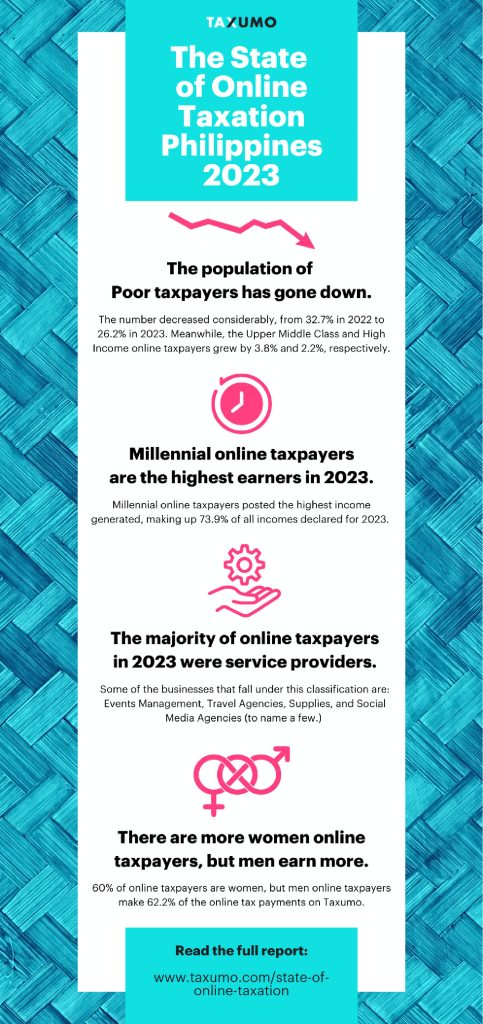MANILA, PHILIPPINES — Taxumo, the country’s pioneer online tax filing and payment platform is back with its 2023 State of Online Taxation report, showcasing important movements of online tax payments in the Philippines during the first year of the Marcos administration.
Last year, Taxumo published the “State of Online Taxation” report, where we saw 32.5% of online taxpayers on Taxumo moved up the tax bracket, revealing an increase in income. Meanwhile, 14.5% of taxpayers on the platform moved down and 53% of subscribers have remained in the same bracket since 2020.
For the 2023 edition of the “State of Online Taxation” report, we will take a look into the movements of online Filipino taxpayers’ incomes, based on their 2022 tax year declarations.

Business outlook is optimistic, as poor online taxpayers shrink in size
The Bureau of Internal Revenue has been making strides to ensure that tax compliance in the country increases. Their hard work has paid off: the agency has reported that they have exceeded their April tax collection targets by over 11%, collecting PHP 336.020 billion last month – PHP 35.114 billion higher than its PHP 300.9 billion goal for this period. This is good news, considering that the business outlook during the last elections was grim, as investors found the lack of a clear economic plan from the newly-elected president troubling.
Recently though, the International Monetary Fund (IMF) has forecasted that the Philippines’ GDP for 2023 will peak at 6%, noting how the Philippine economy “has achieved one of the strongest recoveries in emerging markets following the pandemic-related deep economic downturn.”
The socioeconomic mobility of online taxpayers may be a sign that businesses are doing better in the so-called post-pandemic new normal: the share of Poor in the online taxpayer’s population went down considerably, from 32.7% in 2022 to 26.2% in 2023. Meanwhile, the Upper Middle Class and High-Income online taxpayers grew by 3.8% and 2.2%, respectively.
To note though, there is insignificant to no movement with Low Income, Low Middle Class, and Middle Class online taxpayers. Rich online taxpayers did not grow as well.
Online taxpayers By Age, Gender, City, and Industry
Same as last year, Millennial online taxpayers still are the dominant segment. However, taking second place this year is Generation Z, a place which was occupied by Generation X in 2022. Boomers meanwhile are a tiny 1.5% of the online taxpayer population.
In terms of gender identity, male online taxpayers have been dominating the rest in the total amount of online tax filings. In the latest report for the “State of Online Taxation,” there is a big overtake in online tax payment activity between the Male and Female segments. In 2022, the Male segment slightly overtook the online tax filing by 2.5%. In 2023, however, the Male segment raced ahead toward online tax filing growth by 130% collectively. While the Female segment is now behind, the gender segment still grew by 80% and the Non-Binary segment grew as well to 110% from the previous year.
During this report, we saw that 14.2% of online Filipino taxpayers come from Quezon City. At a distant second is the commercial district of the country, Makati. It is closely tailed by cities from the south of Greater Manila, in order of highest to lowest: Cavite, Laguna, Cebu, Paranaque, Las Pinas, and Muntinlupa.
In this “State of Online Taxation” report, it is also observed that more than half of the filings made by online Filipino taxpayers come from service-oriented businesses. Some of the businesses that fall under this classification are Events Management, Travel Agencies, Supplies, and Social Media Agencies.
Meanwhile, industries like IT & Tech (Software and Computer Related Services) come at a distant second. Medical and Accounting professionals account for 5.7% and 7.1% of the total share, respectively.
Individual professional services like Freelancing, Consultancy, and Virtual Assistance are also visible this year, as the trend of home-based, remote-work setups continue to rise.
EJ Arboleda, CEO of Taxumo, said, “While we remain cautiously optimistic about the continued growth of the country’s economy, we’ve observed in this latest State of Online Taxation report that much needs to be done to make sure that our economic growth is inclusive. Already we’re seeing that women are lagging behind men online taxpayers, while cities outside NCR still are way behind. We’re keen to support our government’s efforts to make sure that doing business is made easier, not just for those who have historically had privilege in society, but for all professionals and business owners.”








